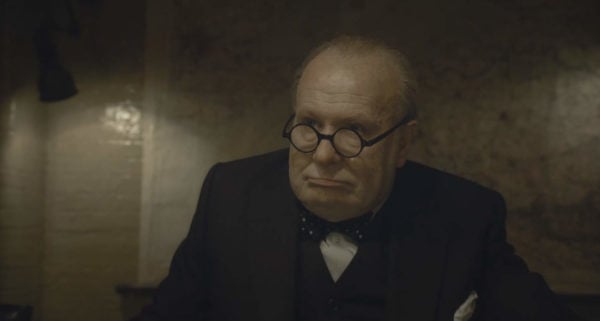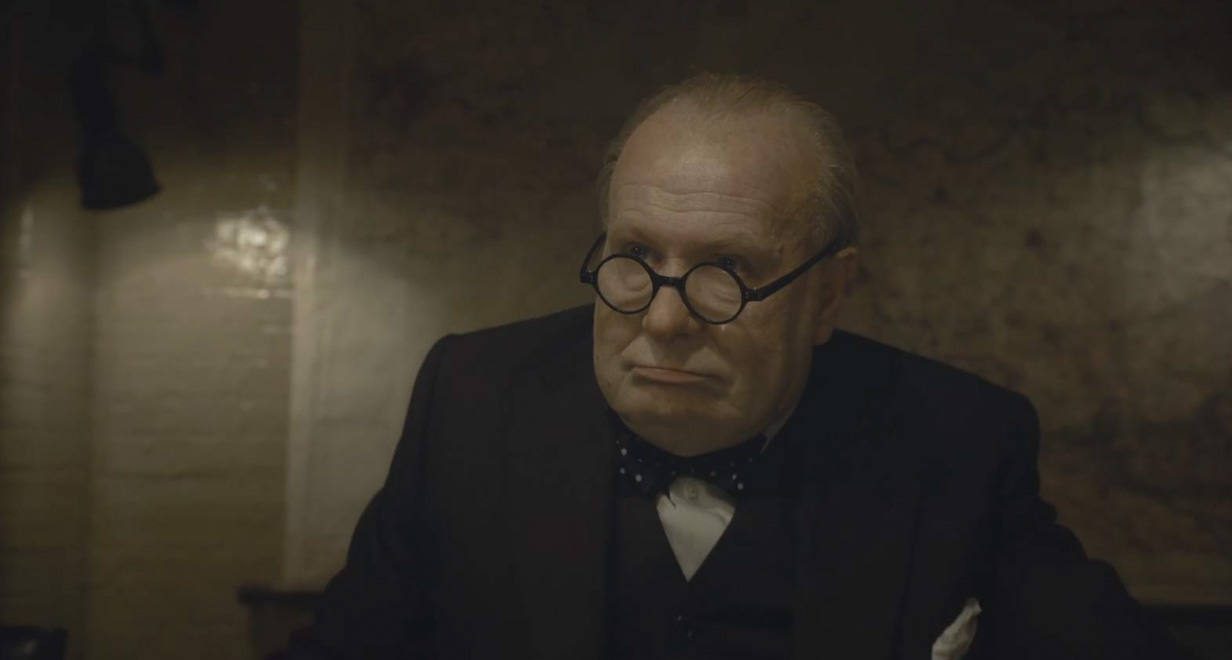
It’s quite likely that if I’d gone into the theater knowing nothing about the film “Darkest Hour” — the second of two Winston Churchill biopics released in 2017 — I wouldn’t have realized that Gary Oldman was playing the British Bulldog until the end credits. Whatever Oldman had to do to coax special make-up effects artist Kazuhiro Tsuji out of retirement was worth it. Buried under layers of make-up and prosthetics, Oldman practically disappears into the role of Churchill. He walks Churchill’s walk and talks Churchill’s talk (not to mention, drinks Churchill’s drink). And when he gives Churchill’s famous “we shall fight on the beaches” speech — arguably one of the greatest of the 20th century — at the end of the movie, it’s thrilling to behold. Oldman is certainly deserving of whatever nominations his performance receives. The same cannot be said for the movie.
“Darkest Hour” begins with the resignation of Churchill’s predecessor, Neville Chamberlain (Ronald Pickup), as Prime Minister in May 1940. Churchill seems to be nominated as a compromise candidate, and it shows; King George VI (Ben Mendelsohn) tells him to his face that he thinks he’s a poor choice, and Chamberlain and Viscount Halifax (Stephen Dillane) plan to force Churchill’s removal by resigning from his war cabinet. Even the French write off this hawkish Englishman as “delusional.” With the European mainland under Nazi control and the United States maintaining neutrality, things look grim for England. Soon, Churchill’s refusal to consider peace negotiations with Germany and Italy leads his cabinet — and even Churchill himself — to question his ability to lead the country.
In these scenes, Oldman embodies Churchill. Oldman convincingly adopts the Prime Minister’s mannerisms, from the way he grips his lapels to the way he chomps his cigars. (Churchill, for that matter, is rarely seen without a drink or a cigar in hand.) In the presence of the supporting cast, Oldman becomes the blustering, scathing Churchill whose put-downs were the stuff of legend — blowing up at Halifax during a heated discussion: “Will you stop interrupting me while I am interrupting you!”; insulting a cabinet member: “He’s a sheep in sheep’s clothing.”
The supporting cast should not go overlooked. Dillane, who played Stannis Baratheon in “Game of Thrones,” plays another brooding, resentful man passed over in favor of a more charismatic leader. Mendelsohn’s King outgrows his initial coldness to emerge as a champion of Churchill’s. But it’s the women closest to Churchill who offer performances that let us latch onto the monolithic figure. Kristin Scott Thomas plays Clementine, Churchill’s wife and confidant, reassuring her husband when he wrestles with self-doubt. Lily James grows close to the leader as Elizabeth Layton, Churchill’s personal secretary. Layton serves as the audience’s window into Churchill’s speechwriting process; James plays her role subtly and affectingly.
Since we’re all familiar with the substance of this story, director Joe Wright opts for style and hopes for the best. While often aesthetically pleasing, the visuals in “Darkest Hour” can come off as studied to the point of lifelessness. A blood-red light illuminates Churchill as he addresses his country on the radio. Clouds of smoke curl off Churchill’s cigars, often during a dramatic pause before an equally dramatic statement. Layton transcribes Churchill’s speeches on a typewriter, and the camera focuses on the words as they are struck onto paper. Churchill, in one of the film’s fleeting acknowledgements of the man’s depression, stares at the sky, bathed in a blue glow, while the camera pans out into the sky. It’s theatrical, to the point that it can’t help but feel artificial.
Speaking of artificial, the film is so rife with anachronisms that it’s insulting. James plays the role of Layton so well that it’s almost enough to make you forget that Layton didn’t start working for Churchill until 1941. Churchill flashes a V sign at photographers, albeit backwards, a full three years before that famous photograph. And the climactic “we shall fight on the beaches” speech, which the film would have you believe took place on May 26, on the first day of the Dunkirk evacuation, wasn’t actually given until June 4, on the last day. Even the famous phrase that provides the name of this very movie — “darkest hour” — was not spoken until June 16, in Churchill’s “this was their finest hour” speech. But the film’s worst offense is a work of complete fiction: Churchill, impulsively, takes to the Underground, and asks his fellow passengers on the Tube if the country should surrender or fight. He talks to a baby, damn it — it’s pure treacle. All of this sits at odds with a crucial part of the film’s plot, where Churchill must decide between offering his people a hopeful message or telling them the unsparing truth. In “Darkest Hour,” Wright elects to do the former. It was not the right choice.
This is what weighs down “Darkest Hour”; it feels too much like awards bait, like it would rather spin a story than tell one. It’s a movie that rarely comes off the screen and engages the audience — especially when compared to Christopher Nolan’s “Dunkirk,” a film that recounts Operation Dynamo from the other side of the English Channel and says much more than “Darkest Hour” does with about half as many words. Most damningly, it never makes the case for itself as anything other than a showcase for Oldman’s acting abilities, which alone aren’t enough to elevate this mediocre film. Even with the supporting cast, “Darkest Hour” feels less than the sum of its parts.
Contact Jacob Nierenberg at jhn2017 ‘at’ stanford.edu.
